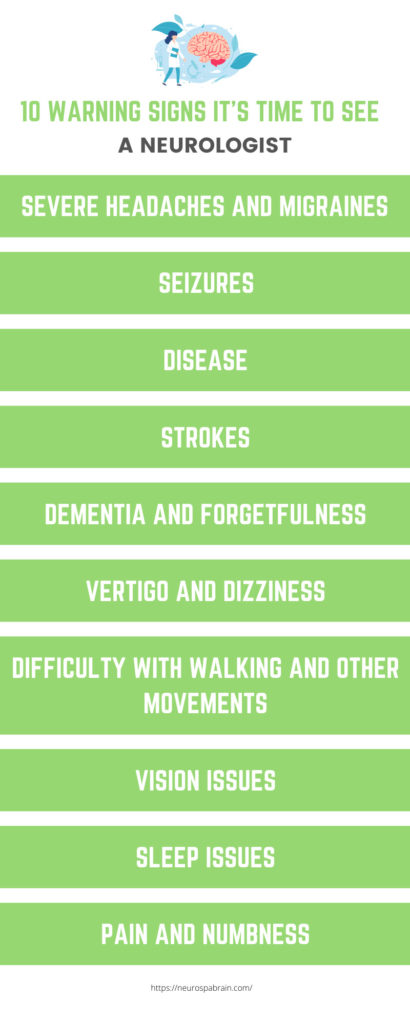With hope, you’ll never need to see a neurologist, but if you do, take heart. Neurologists are highly skilled and knowledgeable about the diseases that affect the brain, spinal cord, nerves, and muscles, and they can diagnose and treat them. Most of the time, a neurologist’s office won’t be your first stop when you experience the following symptoms. See your regular primary health care provider first for an examination and testing. If they have concerns, they may set up a consultation with a neurologist for a deeper look at you and your symptoms. But before it reaches that point, keep in mind the following 10 warning signs it’s time to see a neurologist. Be aware that many of these symptoms can be common and temporary, but if they persist, see your doctor as soon as possible.
Severe Headaches and Migraines
Everyone develops a slight headache occasionally, and sometimes migraines are an irritating, infrequent, and brief occurrence. But some migraines are warning signs of a bigger problem. If you find yourself experiencing migraines to the point where they interfere with the quality of your life, see your doctor. Migraines can last from hours to days, causing severe head pain, stomach upset, throwing up, and the need to retreat to a dark and quiet room to avoid external stimuli. Doctors can’t cure migraines, but there are many treatments, including medication, TMS, and more, that can abate the symptoms. Migraines can also indicate a deeper underlying condition, so get them checked out immediately.
Seizures
Think of seizures as storms in your brain, coming and going with little to no warning. Any number of things can cause seizures. Some people have epilepsy or other disorders that manifest through staring, unconsciousness, confusion, a lack of response, falling, or sudden physical jerking movements. Epilepsy has no cure, but doctors can often treat the symptoms and reduce them, allowing the patient to live a safer life. However, sometimes, seizures happen to people with no history of epilepsy. In these cases, immediate examination by a neurologist is necessary. They must look for evidence of a potential infection, stroke, tumor, or traumatic brain injury.
Disease
Here’s the third of our 10 warning signs it’s time to see a neurologist, though it’s a wide-spanning heading. Many diseases can affect the brain and nervous system, causing several symptoms on this list. While several are incurable, neurologists can help patients deal with the symptoms. Some neurological diseases include Alzheimer’s, Parkinson’s, multiple sclerosis, and neurofibromatosis. Once again, a neurologist can diagnose these diseases, prescribe medication, and suggest and arrange for therapy to keep symptoms at bay.
Strokes
Strokes are as swift and unpredictable as seizures. However, they can cause long-term damage by blocking or bursting a vein or other vessel providing oxygenated blood to the brain. You can starve off strokes through exercise, a healthy diet, and quitting smoking and drinking, among other activities. However, when a stroke occurs, seconds count. A neurologist can treat a stroke while it’s taking place and help prevent them by prescribing medication to break down blood clots. Also, they can treat a patient after the stroke occurs, helping them deal with lost sensation, weakness, movement, and more.
Dementia and Forgetfulness
Memory is a funny thing. Sometimes, we can recall events that took place years before, and sometimes, we can’t remember where we left a cup of coffee. Occasional memory loss is a given for anyone of any age. However, when memory loss grows more pronounced, extended, and potentially hazardous (say when one forgets to take safety precautions or loses one’s way while driving), it could be a sign of something more serious. Older individuals may experience greater forgetfulness as they age, which is a natural process. However, if forgetfulness begins to interfere with your quality of life, it’s time to see a doctor or neurologist about steps one can take to keep the memories.
Vertigo and Dizziness
Vertigo and dizziness aren’t the same things. Dizziness is a sense of spinning, while vertigo provides a similar feeling but with a sense of physical movement. Both are common symptoms of irritating if temporary conditions, viruses, dehydration, hunger, and the like, but if either persists without an obvious cause for extended periods, you might need to see your primary care physician and a neurologist. It could be a symptom of stroke or something affecting the brain or brainstem.
Difficulty With Walking and Other Movements
Everyone can be a total klutz at times, whether you have trouble holding onto a small object, bump into people or things, or have trouble with coordination. But persistent trouble with movement may be evidence of something more troubling. A neurologist can explore and test movement issues. Tremors, jerky motions, trouble walking, and even clumsiness could be evidence of stroke, tumors, disease, or something more easily treated, such as a new drug one is taking, general stress, or some simpler injury. Whatever the case, if movement issues repeat themselves, have them looked over at a doctor’s office or neuropsychiatric clinic.
Vision Issues
Vision issues can be first and best addressed by an ophthalmologist or similar eye specialist. Blurry vision, double vision, diminished vision, and more might require nothing more than eyedrops or new prescription eyeglasses. But sometimes, these can be evidence of a bigger underlying problem, and your eye doctor may recommend seeing a neurologist. Consider this when vision issues result from physical causes, like drooping eyelids and the like.
Sleep Issues
If you have trouble sleeping, eliminate all the obvious elements that can cause it, such as excessive caffeine intake, general stress due to work or life issues, or even a lumpy mattress. If you continuously can’t get a full night’s sleep, see your doctor or neurologist. Neurological diseases like Alzheimer’s and Parkinson’s can prevent you from sleeping, as can epilepsy and several neuromuscular disorders. You need to sleep to stay healthy, so have insomnia investigated as soon as possible.
Pain and Numbness
Pain and numbness are a part of life. Still, there’s a difference between temporary pain and numbness caused by, say, resting on some part of your body until it goes to sleep and excruciating pain or numbness occurring and persisting in a body part with no apparent reason. When in doubt, have it checked out.



